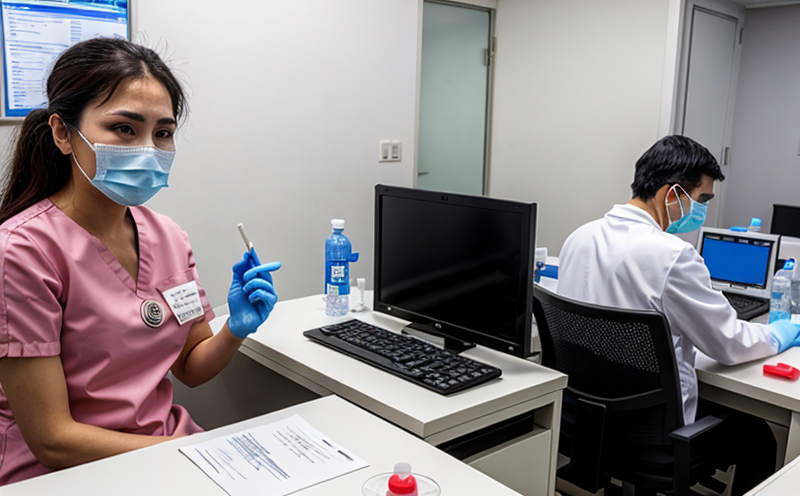Dengue Virus Detection Testing in Aedes Mosquitoes
Dengue virus (DENV) is a global public health concern, causing millions of cases annually worldwide. The primary vectors for DENV are the Aedes aegypti and Aedes albopictus mosquitoes. Detecting dengue infection in these mosquito species can provide critical insights into disease transmission dynamics and control strategies. This testing service focuses on identifying the presence of dengue virus RNA or antibodies in Aedes aegypti mosquitoes, which are essential for understanding vector competence and transmission potential.
The importance of this testing lies in its ability to complement existing surveillance methods by focusing directly on the vectors. This approach allows for more targeted interventions aimed at reducing mosquito populations and interrupting disease transmission cycles. By detecting dengue virus in mosquitoes, public health authorities can implement more effective control measures, such as vector elimination campaigns or the use of larvicides.
The testing process involves collecting mosquitoes from different geographic locations and environmental conditions. Specimen preparation is crucial to ensure accurate results; this includes extracting RNA using a reliable method like QIAamp Viral RNA Mini Kit (Qiagen). Once extracted, the RNA samples are subjected to reverse transcription PCR (RT-PCR) or quantitative RT-PCR (qRT-PCR), following protocols outlined in ISO 15146:2013 and ASTM E2789-19.
In cases where serology is required, serum samples from the mosquitoes are collected post-infection and tested using ELISA kits specific for dengue virus antibodies (e.g., Dengue Virus Antibody Capture ELISA Kit from Abcam). This helps in understanding the immune response of the mosquito to the infection. The results provide valuable information on vector competence, which is critical for assessing the potential risk of disease transmission.
The accuracy and reliability of these tests are paramount in ensuring that public health interventions are effective. By detecting dengue virus RNA or antibodies in mosquitoes, we can identify areas with high infection rates and focus resources on those locations to prevent outbreaks. This testing service not only aids in disease surveillance but also supports research into vector biology and epidemiology.
The detection of dengue virus in mosquito populations is part of a broader strategy to control the spread of this debilitating illness. By monitoring vectors, public health officials can make informed decisions about resource allocation and intervention strategies. This testing service ensures that all relevant stakeholders have access to accurate data, which is crucial for effective disease management.
Why It Matters
Dengue virus detection in Aedes mosquitoes matters because it provides critical information about the role of these insects as vectors for dengue. Understanding vector competence and transmission potential is essential for effective disease control strategies. This testing service supports various stakeholders, including public health agencies, researchers, and pharmaceutical companies, by offering accurate and reliable data.
For public health officials, this information can guide resource allocation and intervention strategies. By identifying areas with high infection rates in mosquitoes, they can focus efforts on those locations to prevent outbreaks. This targeted approach is more efficient than broad-scale interventions, ensuring that resources are used effectively.
Researchers benefit from this testing service by gaining insights into vector biology and epidemiology. Understanding the immune response of mosquitoes to dengue virus through serological tests can lead to new discoveries about vector competence and transmission dynamics. This knowledge is crucial for developing novel control strategies and treatments.
Pharmaceutical companies also find value in this testing service as it provides data that can inform drug development and vaccine efficacy studies. By identifying areas with high infection rates, they can target their efforts on regions where the disease poses the greatest threat. This testing service ensures that all stakeholders have access to accurate data, which is crucial for effective disease management.
Scope and Methodology
The scope of this testing service includes detecting dengue virus RNA or antibodies in Aedes mosquitoes using advanced laboratory techniques. This involves specimen preparation, extraction of viral RNA, and subsequent analysis through RT-PCR or qRT-PCR methods. For serological tests, serum samples are collected post-infection and tested using ELISA kits.
The methodology follows international standards such as ISO 15146:2013 for viral RNA extraction and ASTM E2789-19 for RT-PCR. These protocols ensure the accuracy and reliability of the results, providing stakeholders with confidence in the data generated.
Specimen preparation is critical to ensure accurate results. This involves collecting mosquitoes from different geographic locations and environmental conditions. The specimens are then processed using a reliable method like QIAamp Viral RNA Mini Kit (Qiagen) for RNA extraction. Once extracted, the RNA samples undergo RT-PCR or qRT-PCR analysis.
For serological tests, serum samples are collected post-infection and tested using ELISA kits specific for dengue virus antibodies. This helps in understanding the immune response of the mosquito to the infection. The results provide valuable information on vector competence, which is critical for assessing the potential risk of disease transmission.
Industry Applications
- Public health agencies can use this testing service to monitor dengue virus activity in mosquito populations and implement targeted interventions.
- Researchers can gain insights into vector biology and epidemiology by understanding the immune response of mosquitoes to dengue virus through serological tests.
- Pharmaceutical companies can target their efforts on regions where the disease poses the greatest threat, ensuring that resources are used effectively.





